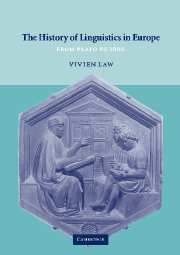Book contents
- Frontmatter
- Dedication
- Contents
- List of illustrations
- List of maps
- List of boxes
- Preface
- 1 Getting ready to study the history of linguistics
- 2 Greek philosophy and the origins of western linguistics
- 3 Towards a discipline of grammar: the transition from philosophy
- 4 From literacy to grammar: describing language structure in the ancient world
- 5 Christianity and language
- 6 The early Middle Ages
- 7 The Carolingian Renaissance
- 8 Scholasticism: linking language and reality
- 9 Medieval vernacular grammars
- 10 The Renaissance: discovery of the outer world
- 11 A brief overview of linguistics since 1600
- 12 Becoming a historian of linguistics
- Research resources in the history of linguistics
- Notes
- Index
7 - The Carolingian Renaissance
Published online by Cambridge University Press: 05 March 2015
- Frontmatter
- Dedication
- Contents
- List of illustrations
- List of maps
- List of boxes
- Preface
- 1 Getting ready to study the history of linguistics
- 2 Greek philosophy and the origins of western linguistics
- 3 Towards a discipline of grammar: the transition from philosophy
- 4 From literacy to grammar: describing language structure in the ancient world
- 5 Christianity and language
- 6 The early Middle Ages
- 7 The Carolingian Renaissance
- 8 Scholasticism: linking language and reality
- 9 Medieval vernacular grammars
- 10 The Renaissance: discovery of the outer world
- 11 A brief overview of linguistics since 1600
- 12 Becoming a historian of linguistics
- Research resources in the history of linguistics
- Notes
- Index
Summary
The notion of ‘renaissance’
Between Classical Antiquity and our own day lie a series of renaissances, so-called ‘rebirths’ of a past phase of history, or more accurately revivals of interest in an earlier period. The Italian Renaissance, the Renaissance par excellence, is the best known, but every survey of European history reveals others: the Carolingian Renaissance, the Ottonian Renaissance, the Twelfth-Century Renaissance, and then, after the Italian Renaissance, the Northern Renaissance. After that the label ‘renaissance’ disappears, and instead we talk about Neo-Classicism, the Gothic revival, the pre-Raphaelite movement. Even the late twentieth-century preoccupation with roots and heritage, with manifestations as diverse as reconstructions of Civil War battles, Anglo-Saxon villages, historical theme parks, Elizabethan feasts, and companies which will trace your family tree, is in its own way a ‘renaissance’ of the past. Although such renaissances are invariably brief, they occupy a disproportionately important place in historical surveys of all kinds, from intellectual history to the history of art and architecture. Why? Isn't a retreat into the past a form of escapism, at best antiquarianism, at worst a failure to get to grips with the present?
In fact, almost paradoxically, each such period presages the appearance of something new. Latent in them is the germ of the next phase of development. Yet how can an interest in the past lead to the future? All back-to-the-past movements have certain elements in common.
- Type
- Chapter
- Information
- The History of Linguistics in EuropeFrom Plato to 1600, pp. 139 - 157Publisher: Cambridge University PressPrint publication year: 2003



